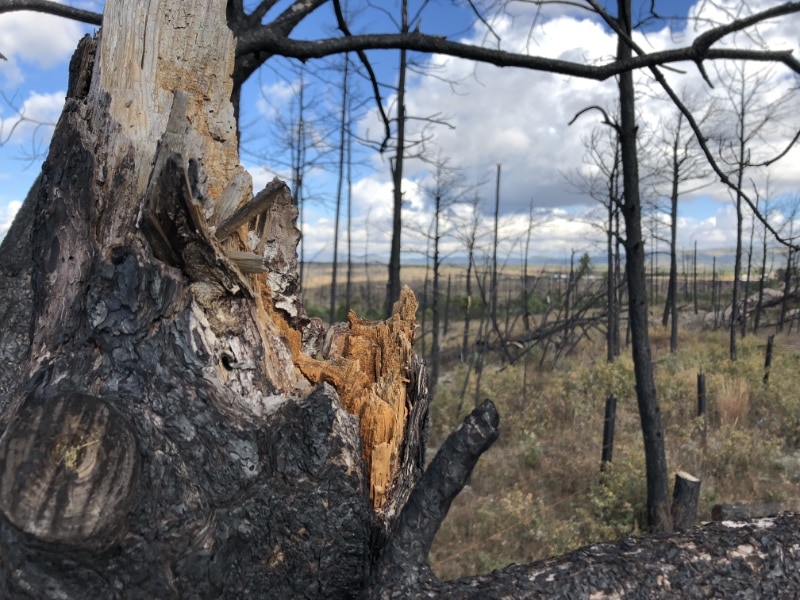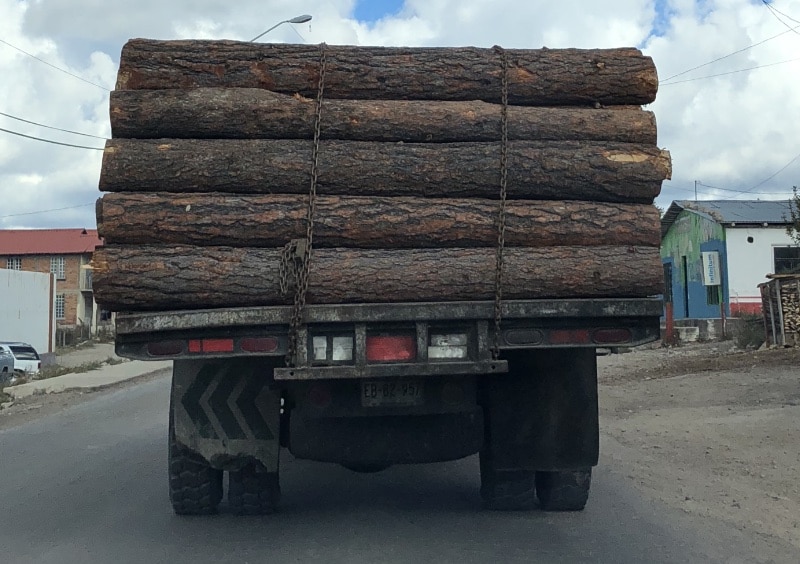Posted by El Profe for Borderland Beat from Insight Crime

Among the most vibrant criminal markets in Mexico is illegal
wood, and in the northern state of Chihuahua, there is increasing alarm
that drug trafficking organizations are fighting for control of the
trade.
The six bodies, minus their heads, were dumped just before dawn on a
morning in late October. They were left in front of a gas station on the
outskirts of Creel, in the state of Chihuahua — each corpse wrapped in a
black bin bag and secured with brown tape around the neck, waist and
ankles.
The scene was typical of the violence that has long played out during Mexico’s drug war, now more than a decade old. But the message taped to one of the bodies referred not to drug trafficking, but the local illegal wood market.
Indeed, the groups involved in black-market logging and drugs now
appear to be one and the same. In recent months, violence between
warring cartels in the pine-covered mountains of Chihuahua, around the
towns of San Juanito and Creel, is as tied to the illegal wood trade as
it is to local drug sales and routes.
The overlap began with a surge in illegal logging.
“Here in San Juanito, illegal logging started to really grow and
become obvious in 2015. The whole area around San Juanito was logged
illegally and indiscriminately, and afterwards they would set fire to
the woods and not let people put the fires out,” Citlali Quintana, a
local lawyer working for the Center for Understanding and Defense of
Human and Indigenous Rights (Centro de Capacitación y Defensa de los
Derechos Humanos e Indígenas), a local non-profit.
As Quintana drives to the indigenous village of Bahuinacachi in her
four-wheel drive vehicle — the only way to reach the tiny town home to
some 200 indigenous families — we pass pine forests that have been
ravaged by unauthorized loggers. The work is badly done — trees have
been left to rot where they have fallen, and swaths of land have been
burned.

Fighting
this scourge has become increasingly dangerous. Some activists have had
to flee, and in November, Julián Carrillo Martínez, an activist for
Alianza Sierra Madre, was murdered by armed men in Coloradas de la
Virgen, in the municipality of Guadalupe y Calvo, Chihuahua, where much
of the non-profit’s lobbying activities have focused.
Carrillo Martínez was under state protection, but government measures
failed to keep him safe that day. The group he worked for told us that
hitmen in the area serve the interests of commercial wood companies as
well as drug traffickers.
The traffickers are not hiding. Residents of Bahuinacachi told
InSight Crime how some 40-armed men arrived in February riding dozens of
heavy trucks. They proceeded to start cutting down trees in the pine
forests on the outskirts of the town. Working day and night for the
first month, the men — all of whom were under 20 years old according to
witnesses — moved some 40 truckloads of wood out of the forests every 24
hours.
Villagers said they could hear the chainsaws working from their
homes, and that the recently-installed leader of the Juarez Cartel, César Daniel Manjárrez Alonso, alias “el H2”, made an appearance during this time, walking into the town.
Wood taken from these forests — which is still happening daily — is
transported by truck to San Juanito and processed there. San Juanito is a
regional economic hub that is home to some 25 sawmills that employ a
significant proportion of the town and process much of the wood taken
both legally and illegally out of the pine forests that coat the hills.
Once wood enters these mills, it effectively becomes legal, by mixing
into the legitimate supply.
It is most often converted into planks for bulk sale to construction
companies and others, or made into furniture. Some could be finding its
way into Mexico’s paper industry, which exports internationally.
Determining the beneficiaries is not easy. Half of the sawmills
operating in San Juanito are part of the Juarez Cartel’s network,
according to sources in local commerce who spoke to InSight Crime on
condition of anonymity. The other half, they said, have to pay a “quota”
(an informal tax levied by the cartel) to operate.
But the crime and violence have more than one master. South of Creel
lies Sinaloa Cartel territory in the Golden Triangle, where the states
of Chihuahua, Durango, and Sinaloa intersect. The climate in this part
of the state allows for the poppy and marijuana plantations that
peppering creeks and canyons. Trees are illegally cut down there largely
to make space for the cultivation of these plants, according to
interviews with governmental and non-governmental sources.
Illegal logging around San Juanito, on the other hand, is for the
sale of the wood itself, and is becoming an increasingly lucrative
activity for Juarez Cartel operatives. That’s the most likely motive
behind the killing of the six men dumped at the gas station who,
according to the state criminal investigation agency, were members of
the armed wing of the rival Sinaloa Cartel, Gente Nueva. A Facebook video
that emerged after the murder suggests the same, and shows the
sicarios, now dead men, showing off their weapons in front of the
camera.
InSight Crime was warned not to conduct interviews in San Juanito. A
local businessman we interviewed, who preferred not to be named for
security reasons, said: “If you throw a coin in the air it will hit
someone involved in illegal logging when it comes down —whole families
are involved.”

But
how and when drug trafficking began to intersect with the illegal
timber trade is harder to pinpoint. Local wisdom dictates that drug
trafficking groups embraced illegal logging in part as a collateral
benefit of their territorial control, and as a way to diversify their
criminal portfolio, which had suffered after a drop in market prices for
poppy paste and marijuana.
“El narco has always been here, and everyone learned to live with
them but the ‘drug war’ [launched by President Felipe Calderon in 2006]
prompted them to protect their territories more,” says Isela Gonzales,
director of the Alianza Sierra Madre, who spoke to InSight Crime in
Chihuahua, where she is under government protection after receiving
death threats. Her non-governmental organization has lobbied
successfully to freeze logging permits so that individuals and firms
using them can be investigated for potential abuses.
Experts consulted by InSight Crime agree that the current permit
system managed by the Mexican government is insufficient to regulate
illegal logging in states like Chihuahua, and that agencies such as the
Federal Prosecutors Office for Protection of the Environment
(Procuraduría Federal de Protección al Ambiente — PROFEPA) don’t have
the resources or manpower to curb illegal activity of this scale.
“The police work for [the cartels] — there are no good ones, only bad ones,” said Gonzales.
Gonzales’s assertions were backed by other sources interviewed by
InSight Crime, who said that locals are as afraid of the state and
municipal police as they are of the criminal groups operating in the
area. Gonzales added that political and business elites, as well as
criminal groups, are all working together to over-exploit legal permits
to log.
With the huge availability of pine trees in the area, as well as a
lack of regulation and continuing pressure on drug prices and routes,
illegal logging in Chihuahua looks set to keep growing as a profit
engine for organized crime.










Thanks profe. I just don't get how such a large group of people can lack any foresight! I'm not a tree hugger but believe in proper forest management. Logging is one way of managing it. But cutting and burning everything isn't. It's like waking up in the morning and saying "geez,there are too many trees in my view. I want more desert." Seems crazy to me. I'm from Minnesota. Remove the trees and I'd want to move!
ReplyDeleteMn
The people who decide to cut the trees do not stay in the area. They do not care if the locals starve. All they want is quick profit.
DeleteIsn’t creel the town where that now infamous YouTube video, of a convoy creating a roadblock and sniffing coke out of a big bag before assaulting a large home, in the early morning, took place? I never knew if I could trust the explanation video of that footage which is on YouTube. Anyone know the legit story of that footage?
ReplyDeleteFinesse
How many times have we heard that if we just legalized “drugs” the cartels would simply go away?
ReplyDeleteThis happened in michoacan and that's a reason the indigenous towns started a autodefenza and kicked out the cartel that was cutting down trees to sell to china. They need to kick them out of chihuahua
ReplyDelete